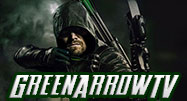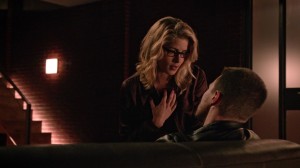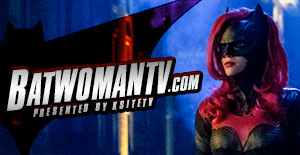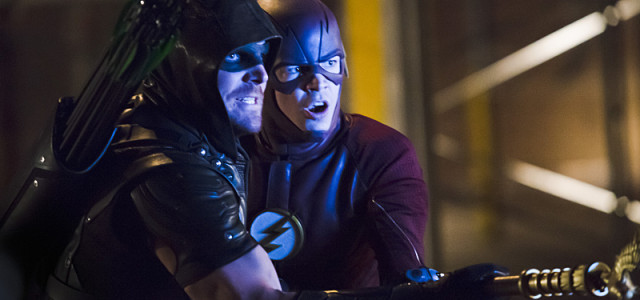
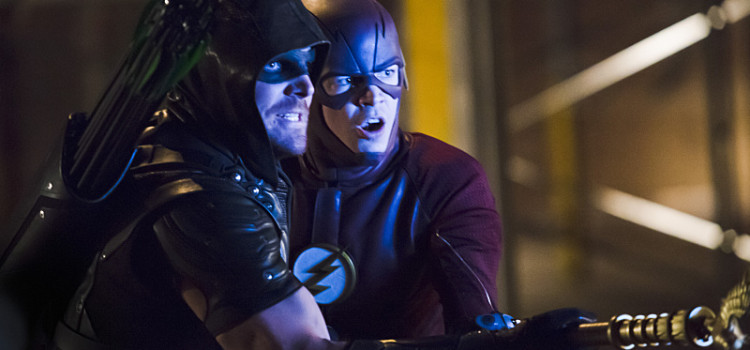
Arrow #4.8: “Legends of Yesterday” Deep Review
Recaps & Reviews December 6, 2015 Matt Tucker

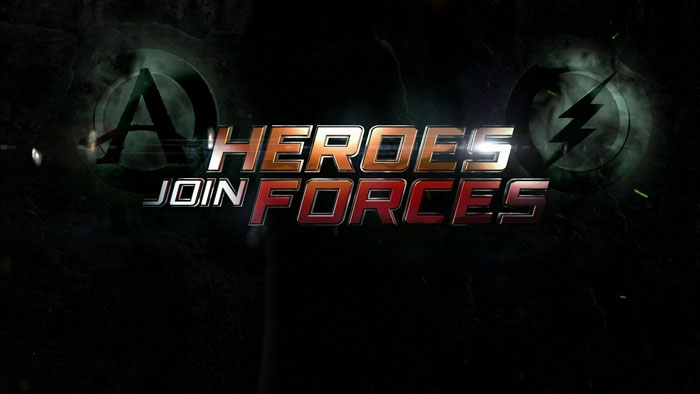
Summary: The closing part of a better crossover has some glaring issues but a lot of positives and lasting effects for all separate series.
If you have not seen this episode yet and do not wish to be spoiled, do not continue reading!
For a full episode synopsis, grab a read of our Quickshot Recap: #4.8: “Legends of Yesterday”
Review
We’ve come to what will now be the annual crossover event. (Though, once Legends of Tomorrow is up and running, might we expect another crossover in the latter part of the season each year? If so, that’s going to take a hell of a lot of planning and coordination; Arrow and The Flash are usually pretty deep into their final act runs of the season by that point.) Each year, just prior to the midseason finales, we’ll be getting this lovely series jumping episodes that enforce just how these shows all exist in the same world. They regularly reference one another, though, so while this “Episode 8” thing — take that, Star Wars — is decidedly eventful, they don’t necessarily feel like everything is saved up just for this moment.
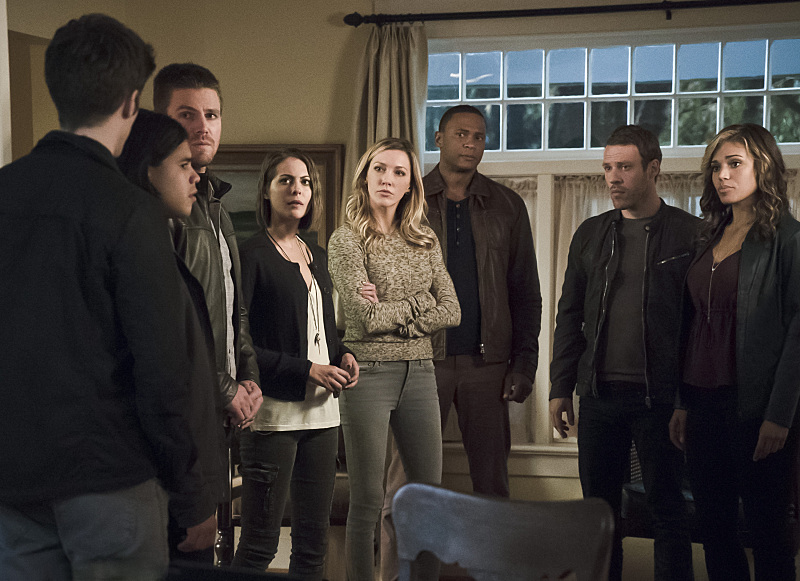
As an event, though, there has to be a catalyst worthy of sparking a story that heavily involves Team Arrow and STAR Labs partnering up like swim buddies and spending significant time in each other’s respective cities. Right off the bat, “Heroes Join Forces” feels like the more successful of the two crossovers, primarily because it is a legitimate single narrative spanning two episodes. The fact that The Flash now has an established year under its belt also adds tremendously. There is a world of investment now in the Scarlet Speedster and his crew that simply wasn’t there at this time last year, no matter how effectively they kicked off the new show. What’s particularly interesting is this gives a lived-in feel specifically to Barry’s relationship with Team Arrow. When Barry and Oliver talk now, it’s very much kin. Barry’s seen some stuff and his maturity is evident in the way he interacts with his somewhat mentor. Oliver also seems to see Barry less as a neophyte and more as an equal. They might hit the highlights in a Hero SportsCenter kind of way from time to time, yet it’s clear that their independent realities keep them to busy to offer encyclopedic evidence of what’s going on in their lives. Still, Oliver seems to innately sense that Barry has grown and even though there are points where he gets a little growly with his younger friend, it seems more out of concern than out of Oliver’s sense to want to control everything.
But beyond the sense of experience, what kind of worked against “Flash vs. Arrow” was that it was, essentially, two tangentially related episodes. The first episode was all about Rainbow Raider and Barry become mind controlled to go evil, forcing the fight between he and Oliver. The antagonist in the Arrow portion of the crossover was Digger Harkness, aka Captain Boomerang, who had already been introduced at the end of the preceding week’s Arrow episode. That disjointed feeling was also reinforced by the very different feels of each series. While the whole endeavor was fun, it wasn’t quite the crossover we were looking for.
“Heroes Join Forces” is quite different because these are two halves of one story. They could easily have aired this as a 2-hour movie and, aside from Laurel missing during The Flash hour and Wells and the Wests gone from the Arrow hour, it would’ve flowed together fine. The alterations to tone and approach for Arrow in Season 4 have also helped to align it well with the more colorful and fantastical world of The Flash to create a more seamless interaction. What’s particularly fascinating is that this is ostensibly the “backdoor pilot” for Legends. Even the titles of the episodes are geared specifically toward that purpose. In ways, though, it doesn’t feel like a pilot for that show because it did little to set up anyone else beyond the Hawkpeople and Vandal Savage. None of the other characters from the soon-to-premiere series appeared and very little set-up for the tone and texture of that show was evident. Instead, this provided the background for the new show without giving away much of its secrets.
Rock Out with Your Hawk Out
That background is in the form of the relationship between the three ancient Egyptians, Prince Khufu, the priestess Chay-Ara, and the head of the clergy Hath-Set. This makes for an intriguing history and compelling dynamic that provides real agency to the events occurring in the episode. Rather than just offering origins to either Carter Hall or Kendra Saunders, which we certainly get to see as well, it instills real purpose to each having to discover who they truly are as both a means of survival and as a counteragent to this immortal evil.
The choice of combining two DC Comics villains into their version of Vandal Savage is slightly odd but actually serves his character and the other two very well. Savage is, of course, the big bad for Legends, but it should be noted that the series is intent on featuring very different story arcs each season. Whether that means the first season will see the end of Savage for good or not remains to be seen, but they seem very clear about completing this particular arc with him during that first frame. That makes providing his backstory here a smart move as they can just move on to his wrath and campaign for world domination. With the time travel mechanism of the series, they wouldn’t even have to do flashbacks but show Savage’s influence or history by directly going to it.
They don’t completely abandon Savage’s comic book origins. In the comics, Savage was a caveman (hence the name) who became imbued with superhuman abilities and his immortality by a mysterious meteor that struck near him on prehistoric Earth. They keep the meteor influence here but tie it to the Egyptian mythology that serves as the basis for Carter’s and Kendra’s story. Hath-Set in the comics was a priest who also fought Khufu and Chay-Ara and killed them with a knife made of Nth metal. The mystical properties of the metal forced them into the relationship where all three are reincarnated over time and tied into one another’s lifeforce. Hath-Set then hunted the other two down to kill them repeatedly from life to life. The change here for the show is that Savage hasn’t died. He’s simply used Khufu’s and Chay=Ara’s lives to keep himself immortal. It’s especially funny when Cisco refers to him as Highlander during the The Flash part of the crossover before knowing anything about him. Highlander was, of course, a film about immortals forced to fight each other over time, taking the lifeforce of slain immortal into their own until the eventually reach the Quickening, a final showdown where one immortal is left standing and claims “The Prize.”
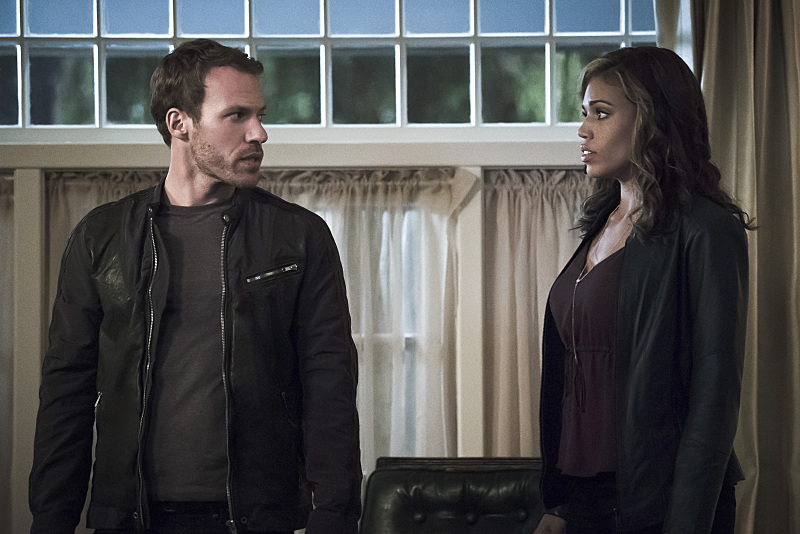
By giving Savage the Hath-Set backstory from the comics, it makes the stakes very personal for the Hawk folk here, as well as on Legends going forward. What’s also a captivating choice was in making Chay-Ara a member of the clergy, as well. As Carter pointed out, the clergy were warriors, but they were also seers and soothsayers, those entrusted with providing health to the Pharaoh and his bloodline. Carter continued to press Kendra to focus on the warrior aspects because that’s how he’d come to know her over lifetime after lifetime. Cisco’s recommendation to instead focus on the priestess aspect was inspired because it offered a different flavor for the character than from Carter. In the comics, Chay-Ara was a princess consort. She’d learned to become a warrior over their many lifetimes while training with Khufu, but she didn’t start that way. Making her a warrior provides Kendra with the resource background to draw upon when they need to fight Savage and his soldiers going forward. Yet offering the other end could, at the very least, provide some good dramatic avenues if not all manner of other ability useful to the team. Carter said he was never able to recall their original death. It was Kendra who was able to do that, and I have a feeling she’ll be able to provide greater insight like that as they move forward.
I was a bit unsure how I was going to react to the concept of the wings for Hawkman and Hawkgirl not always being present. Tying it to their abilities is a solid choice, and logistically not having to worry about practical wings all the time has to be a godsend for the costumers. It also comes in quite handy for them being able to hide amongst people and also being able to use their wings without having to get into full Hawk regalia. How and why Horus answered Chay-Ara’s prayer with their abilities was glossed over, but that might give them something to explore in the new show.
Overall, all three were enjoyable. Falk Hentschel cuts a strong enough figure as Carter but we got little time to really get to know him beyond be brusque and a fount of exposition. Ciara Renée feels believable throughout as someone overwhelmed by this incredible news of their past and scared of the responsibility of it. It’s nice that they gave her moments of strength and stamps of identity but didn’t just completely turn her into a badass with full knowledge of her past and everything she can do. There is still plenty for her to learn and to explore, and Renée never gets ahead of that. Her work with Carlos Valdes is fun and touching, which gives us a taste of things she’ll get to explore with Hentschel as they delve into this centuries old love story. And Casper Crump as Savage is a menacing blast. There’s history behind what he’s doing, but his villainy is fairly one-note. It’s a fun note, but it’ll be good to see him expand Savage’s inner life in the new show.
Run, Barry, Run
Something to really appreciate about this crossover is that it wasn’t just a diversion from the season arcs running on both shows. Yes, last year there was a little bit of learning by both of our heroes, but it was sort of the Aesop’s Fables variety. More important, it really jumped right in the middle of what both shows were doing at the time and felt a bit odd as a result. Here, there isn’t necessarily learning as much as there is advancement of each lead’s story, something directly related to each season arc.
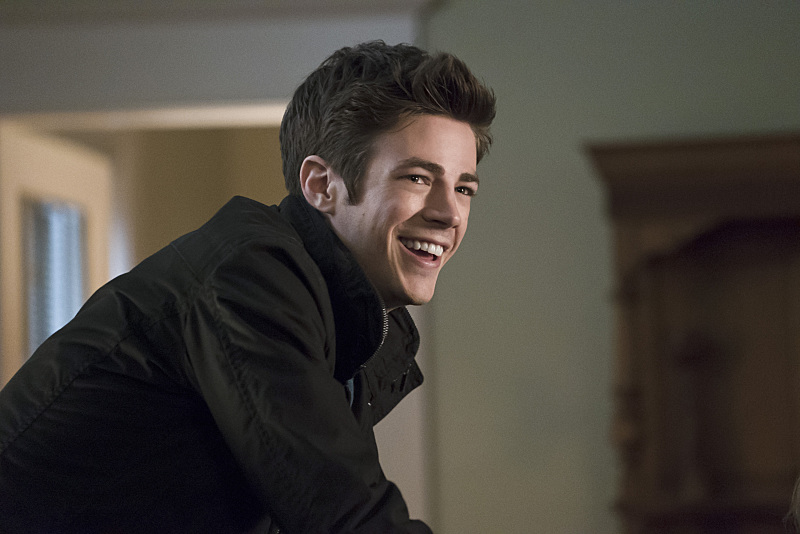
In Barry’s case, he hadn’t been back to full strength following the ultra-humiliating back breaking Zoom gave him. Initially, Barry struggled with the failure, kind of like a batter losing his nerve after being beaned by the ball. Oliver went through a similar struggle when Merlyn handed him his hood during their first confrontation back in Season 1’s “Year’s End.” Barry had healed just fine, but he couldn’t push past the mental blocks that had formed, the doubt that he could truly be the hero Central City needs. He finally got some breakthrough, but as is often the case when dealing with the brain, it’s never just black-and-white, cut-and-dry. The worry with Barry was that he had somehow lost some physical ability to really tap into the Speed Force. This was why Harry Wells was trying to push forward on his Velocity 6 serum. As Jay Garrick explained, the Speed Force is a natural, living thing, and though an accident of science might have connected speedsters to it, it’s their relationship to the Speed Force that allows them to tap into its vast power and potential. Harrison Wells/Eobard Thawne introduced Barry to this concept in last season’s finale, and in a way, Barry needs to take some of the same medicine he was offering Kendra about letting go and trusting herself to become herself.
The Flash uses a very specific three-word phrase to signify the emotional importance of Barry’s ability: “Run, Barry, Run.” To have Oliver say it to his friend to get him to escape Savage’s blast from the Staff of Horus that levels the city was a slightly surprising but quite meaningful moment. The threat of the devouring energy kicked in a natural survival instinct in Barry, to be sure. When faced with dire choices, we silly humans can often find strength of character we never knew we possessed. But more important, it allowed Barry to get out of his own way, as with Kendra finally “emerging.” In the first hour, Caitlin presaged this turn of events by telling Wells that the fastest Barry had ever run was when he was able to break the time barrier. So, Barry getting out of his head and pushing his speed back to the level where he traveled back in time, ghosting his 24-hour past self was a vital moment for his story this year. It was a reclamation of self.
Oliver saw how very clearly that was needed. Barry’s continual worry of Kendra prompted Oliver to press pause and ask just what the hell was going on. Barry had to admit that he felt powerless, particularly at the hands of Zoom. The confrontation with an immortal and seeming endlessly reincarnating souls from Ancient Egypt blew the lid off of that concept for the young CSI. Oliver’s very obvious reaction of understanding that completely was both funny and honest given that he’s a trained assassin with a bow and arrow now dealing with a world of magic. Not to mention the whole metahuman explosion and talk of an Earth 2. In having that discussion, and in Oliver sacrificing himself in the first go-round of the fight for Barry to live and fight again, was a very important catalyst for Barry to reconnect with the Speed Force in such a fashion. It’s likely that it won’t be that simple of a fix once The Flash is back to dealing with its own season arc, especially with the introduction of Velocity 6, but it at least shows Barry that he is still capable.
Billy the Kid
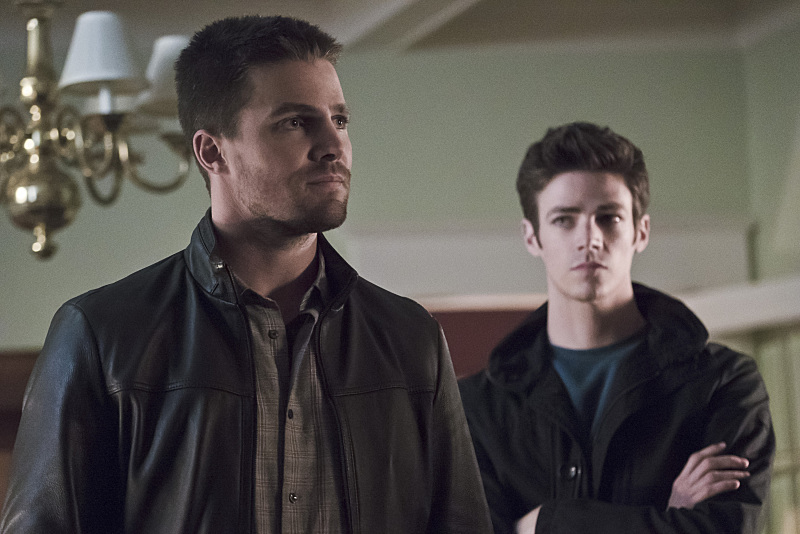
The subtle subtext of Oliver’s journey this year is the maturity of the man.
In some ways, it’s sort of mundane when juxtaposed with the mystical elements they’ve unleashed on the series this season. Yet, it’s a very necessary step in the evolution of Oliver Queen the person. He was listless, floating through life in an orgy of booze and irresponsibility. How fitting then that he would be cast adrift from a boating “accident” and marooned on a seemingly deserted isle. His second chapter became a tearing down of the privileged and unaffected lifestyle he’d come to know, inhabiting him with spiritual debt and an overwhelming sense of justice bore out through gruesome survival. He traded his innate morality to live and that left him vulnerable to the machinations of Amanda Waller and A.R.G.U.S. that set him on his true path in life. He was ground into an assassin, and after the death of little Akio last year, he’d become scared of the monster inside. Waller again pushed him to use that monster, tossing him right back to the island for the flashback story we’re watching unfold this year. Between the mysticism he’s sure to face in his inevitable confrontation with Baron Reiter, and his likely to be seen dealings with the Russian Bratva this year or next, he’ll eventually become a cold, hardened vigilante seeking to put right the wrongs of his city in honor of his late father.
We’ve seen Oliver grow from that over the last 3+ seasons to become a caring, compassionate, and engaged person. He learned that being a hero and helping those who can’t help themselves meant more than vengeance and punishment, and that killing wasn’t the only means to an end. He began to connect to his family as a person in ways he’d never done before, and that extended to the close friends in his life. He eventually confronted an ingrained darkness in himself that he finally let go to accept that he could be happy. Happiness involves him being that masked protector for the city, but he also saw the need for other means.
His motivation this season is to do things out in the light of day, to avoid the trappings of his darker side and provide hope. Running for mayor is, perhaps, even more selfless than being Green Arrow, and the man doing that is far different than the spoiled brat or the living weapon of his past. Whether you like the relationship or not, Oliver finding love with Felicity provides a stepping stone to more mature pursuits, and it’s a growth Oliver Queen needed.
Which makes the controversial choice to present Oliver with fatherhood welcome yet daunting. Anytime a child is introduced into a series, it changes not only the stakes but quite often the tenor of a show. Often, it’s a creative Hail Mary to try to reinvigorate an aging show losing its audience or to re-energize a waning writing staff. It frequently doesn’t work out very well. But in this case, this was a long term element, first threaded into the show back in the late Season 2 episode “Seeing Red.” It’s not without precedent. The Oliver Queen of the comics was known as a ladies man, and the introduction of his son, Connor Hawke, was meant to be a wake-up call against his caddish ways, as well as a clear lesson about consequences of one’s choices. More important, though, was that Connor was able to help pull Oliver out of a spiritual funk both after he’d been dumped by Dinah for being unfaithful and after he was forced to take the life of best friend Hal Jordan when he, though possessed by a being of evil energy, went on a cosmic rampage in a series of complicated storylines in the early 1990s. Oliver wasn’t aware Connor was his son as he first got to know the young man but would eventually find out.
Instead of making Oliver’s former fling Sandra Hawke and his 9-year-old son Connor, apparently for the opportunity to potentially use Connor Hawke as a different character at some point down the line, Samantha and William present some intriguing dramatic paths. Perhaps most telling is how immediately Oliver is impacted by his discovery. This is a man who even two years ago might not have been as deeply engaged in wanting to confirm that William is his son and having the strong pull to make him a part of his life. There is something about approaching 30 (or passing that threshold) in which the urge for family grows substantially, and given how much both he and Thea have lost, that has to be even more alluring. That might offer some insight into how Oliver could make such a boneheaded decision (twice) regarding Samantha’s arbitrary rules for Oliver’s contact with William.
Samantha proves to be someone a bit different than we were led to believe back in Season 2. She didn’t cash the check for Moira Queen’s hush money, and she’s clearly a committed mother who wants nothing more than to protect her child. Knowing a number of single mothers, the mama bear instinct is very real, and trying everything to have control of situation like this offers some leeway for her ask of Oliver. It’s a bit of squishy logic, though, and one can’t help but feel it a somewhat forced plot point to open Oliver up to a lot of drama. That desire to get to know his son is overwhelming, and Oliver is nothing if not consistent in making frustrating decisions. He’s very human that way, even if his internal logic doesn’t always provide a clear rationale to the audience for those decisions.
The point of this is to further evolve Oliver’s growth as a responsible and self-possessed man. Seeing how knowledge of a child affects Oliver’s activities as the Green Arrow holds promise, as well as his further interaction with Samantha. Anna Hopkins and Stephen Amell do strong, touching work, and both never feel like they aren’t invested in taking care of William’s needs and his emotional well-being trying to navigate a tricky situation. I look forward to seeing their growth as co-parents. Also, the fact the Oliver is a political candidate with an newly discovered illegitimate child is sure to present all sorts of challenges in that realm. But it’s clear there’s one relationship that is really going to be tested and/or strained by this latest development.
Olicit Affairs
The fight was patently ridiculous. It’s not that there wouldn’t necessarily be conflicting emotions and wrong turns taken during the discussion; this is tremendously new ground, especially for a couple who had only just each found a functional romantic relationship. And Felicity isn’t necessarily wrong to question Oliver’s respect for her trust with the way he approached it all. This is exactly part of the conflict that had Oliver and Diggle on opposite ends after last year. But the whole interaction felt false, particularly following the moment where a clearly emotional Oliver tells Felicity that his world has just erupted and he needs a moment to process yet she continued to press her issue. Having the gift of Barry’s time travel do-over seemed to give them license to just go off the rails simply for the shock value. While sometimes that can be fun — seeing Savage’s energy blast elementally pull everyone apart — this felt like trying to be provocative just to fire a section of the audience up.
It could conceivably be said that the fight revealed some hidden issues Felicity has with her faith in Oliver’s trust, and that it informed her concern at the end of the episode in the new timeline and potentially moving forward. That’s not an entirely unfair concept, and one would have to assume that any of the members of Team Arrow probably harbor such concerns over Oliver in the backs of their minds, whether they acknowledge them or not. That’s earned through his actions. But the fire with which Felicity exploded seemed unearned, a clumsy way to introduce the thought into the narrative. It also painted Felicity in an unattractive and selfish light. While it’s far from bad to offer all sorts of shading to any of the characters to make them more believable people on-screen, this had the surely unintended effect of making her unlikable and without cause.
Coupled with an example of some of the laziest writing I’ve ever seen on the show, this felt decidedly regressive for Felicity. That gem of scripting will henceforth be known as the Betamax Debacle: Felicity is able to play an outmoded tape technology on a TV from her computer with no specialized player and in less than 30 seconds time. This is what I was talking about last season when they would use Felicity as a Swiss Army knife to easily write themselves out of any technology problems; it’s poor, lazy writing that doesn’t respect the intelligence of the audience. And it’s glaring in a show that asks us to accept people who can manifest bird wings at will that give them enhanced strength and senses, amongst other things. Think I’m alone, do a search for “Arrow Betamax” on Twitter. This felt like a backwards step to the troublesome Season 3 Felicity, and it was all the more noticeable because they’ve taken extra pains to course correct with her this season.
To paraphrase the movie Tropic Thunder: you never go full Season 3, Arrow. Never [again].
But this isn’t a baby/bathwater situation worthy of tossing out the season, by any means. And in fairness, one also has to point out that Cisco is able to develop an isotope from the Nth metal meteor rock to use in the gauntlets in less than an afternoon. Yes, all these folks are extremely intelligent, but there are practical realities you just can’t dismiss on a whim. Some will argue credulity shouldn’t matter on a superhero show, but there has to be a frame of reference of reality for the superhuman aspects to play off of.
Despite Oliver’s anything-goes desire to be involved in William’s life and to get to know his son, him not sharing this huge thing with Felicity is clearly a wrong move. I hesitate to say it’s not believable because we’ve seen enough of Oliver’s actions and thought process to actually buy into it, whether we agree with it or not. It will be interesting to see how Felicity and Oliver (and the writers) navigate this as the season goes on. The way they’ve addressed their relationship has been fairly adult and mature this season, and even fairly graceful with the balance of not avoiding it but also not drowning the show in it. At some point, drama was going to have to poke its head into it to keep it from appearing stale, but one just hopes that they approach the challenges of Oliver being a father with similar maturity.
Conclusion
“Heroes Join Forces” proves a better crossover than last season’s “Flash vs. Arrow” event. The story was more cohesive and it offers lasting effects for both Arrow and The Flash, as well as the new kid on the block, DC’s Legends of Tomorrow. The interpersonal dynamics in the first hour prove more fun and compelling than this hour, but that doesn’t make this closing frame less engaging. Some glaring issues aside, the way that Oliver, Barry, their teams, and newcomers Carter and Kendra work together is exciting and surprising in how comfortable it all feels. We’ve had connections and interactions over the last two seasons, but this is truly the first time that the universe felt like a living, breathing whole. If something were to happen where only one series could be on the air, it wouldn’t feel out of place or short the audience in anyway if they all just appeared in one series like this. And if it looked as good as this hour, as well, chocolate gravy on a sweet sundae.
Odds & Ends
• The Betamax tape shows a timestamp of a date in April 1975. However, Sony’s Betamax format wasn’t available until May of that year in Japan, and not in the U.S. until November 1975. Beta was considered a superior video format to the more popular VHS and became a niche product. It was actually only last month, on November 10, that Sony announced that they were finally discontinuing production of Betamax tapes. The format will be unavailable for first-run sales as of March 2016.
• Professor Aldus Boardman, featured on the tape, will have a presence on Legends of Tomorrow
• What in the world brought on the confrontation that Team Arrow was having with Damien Darhk when Barry came to get them? Seemed like a pretty engaged confrontation for just a toss-away, especially considering it was at an A.R.G.U.S. facility.
• How great was Darhk’s reaction to the Flash? Neal McDonough is an absolute pleasure this year.
• Almost as great as Thea’s reaction to Ollie and Diggle knowing the Flash.
• Dealing with a mystical someone as significant as Vandal Savage, it begs the question of why the team wouldn’t call John Constantine to assist. We know the behind-the-scenes of why, but in the story of the show, it seems like they’d want to take advantage of the resource.
